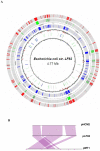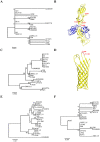Complete genome sequence of Crohn's disease-associated adherent-invasive E. coli strain LF82
- PMID: 20862302
- PMCID: PMC2941450
- DOI: 10.1371/journal.pone.0012714
Complete genome sequence of Crohn's disease-associated adherent-invasive E. coli strain LF82
Abstract
Background: Ileal lesions of Crohn's disease (CD) patients are abnormally colonized by pathogenic adherent-invasive Escherichia coli (AIEC) able to invade and to replicate within intestinal epithelial cells and macrophages.
Principal findings: We report here the complete genome sequence of E. coli LF82, the reference strain of adherent-invasive E. coli associated with ileal Crohn's disease. The LF82 genome of 4,881,487 bp total size contains a circular chromosome with a size of 4,773,108 bp and a plasmid of 108,379 bp. The analysis of predicted coding sequences (CDSs) within the LF82 flexible genome indicated that this genome is close to the avian pathogenic strain APEC_01, meningitis-associated strain S88 and urinary-isolated strain UTI89 with regards to flexible genome and single nucleotide polymorphisms in various virulence factors. Interestingly, we observed that strains LF82 and UTI89 adhered at a similar level to Intestine-407 cells and that like LF82, APEC_01 and UTI89 were highly invasive. However, A1EC strain LF82 had an intermediate killer phenotype compared to APEC-01 and UTI89 and the LF82 genome does not harbour most of specific virulence genes from ExPEC. LF82 genome has evolved from those of ExPEC B2 strains by the acquisition of Salmonella and Yersinia isolated or clustered genes or CDSs located on pLF82 plasmid and at various loci on the chromosome.
Conclusion: LF82 genome analysis indicated that a number of genes, gene clusters and pathoadaptative mutations which have been acquired may play a role in virulence of AIEC strain LF82.
Conflict of interest statement
Figures







References
-
- Podolsky DK. Inflammatory bowel disease. N Engl J Med. 2002;347:417–429. - PubMed
-
- Shanahan F. Gut flora in gastrointestinal disease. Eur J Surg. 2002;(Suppl.):47–52. - PubMed
-
- Elson CO. Commensal bacteria as targets in Crohn's disease. Gastroenterology. 2000;119:254–257. - PubMed
-
- Sartor RB, DeLa Cadena RA, Green KD, Stadnicki A, Davis SW, et al. Selective kallikrein-kinin system activation in inbred rats differentially susceptible to granulomatous enterocolitis. Gastroenterology. 1996;110:1467–1481. - PubMed
-
- Lamps LW. Pathology of food-borne infectious diseases of the gastrointestinal tract: an update. Adv Anat Pathol. 2003;10:319–327. - PubMed
Publication types
MeSH terms
Substances
LinkOut - more resources
Full Text Sources
Medical
Molecular Biology Databases

